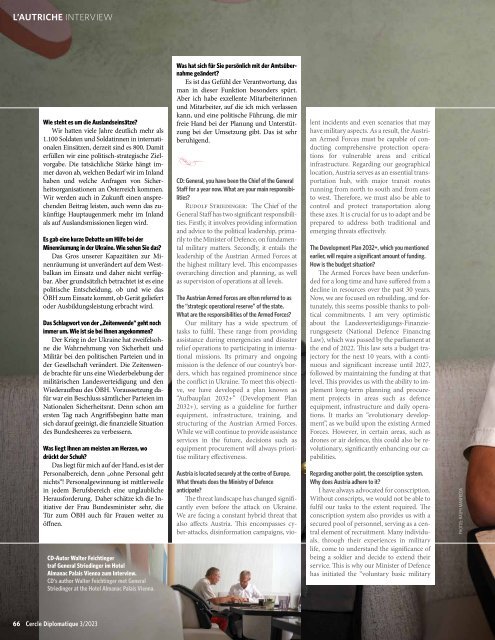CERCLE DIPLOMATIQUE - issue 03/2023
CD is an independent and impartial magazine and is the medium of communication between foreign representatives of international and UN-organisations based in Vienna and the Austrian political classes, business, culture and tourism. CD features up-to-date information about and for the diplomatic corps, international organisations, society, politics, business, tourism, fashion and culture. Furthermore CD introduces the new ambassadors in Austria and informs about designations, awards and top-events. Interviews with leading personalities, country reports from all over the world and the presentation of Austria as a host country complement the wide range oft he magazine.
CD is an independent and impartial magazine and is the medium of communication between foreign representatives of international and UN-organisations based in Vienna and the Austrian political classes, business, culture and tourism. CD features up-to-date information about and for the diplomatic corps, international organisations, society, politics, business, tourism, fashion and culture. Furthermore CD introduces the new ambassadors in Austria and informs about designations, awards and top-events. Interviews with leading personalities, country reports from all over the world and the presentation of Austria as a host country complement the wide range oft he magazine.
Create successful ePaper yourself
Turn your PDF publications into a flip-book with our unique Google optimized e-Paper software.
L’AUTRICHE INTERVIEW<br />
Wie steht es um die Auslandseinsätze?<br />
Wir hatten viele Jahre deutlich mehr als<br />
1.100 Soldaten und Soldatinnen in internationalen<br />
Einsätzen, derzeit sind es 800. Damit<br />
erfüllen wir eine politisch-strategische Zielvorgabe.<br />
Die tatsächliche Stärke hängt immer<br />
davon ab, welchen Bedarf wir im Inland<br />
haben und welche Anfragen von Sicherheitsorganisationen<br />
an Österreich kommen.<br />
Wir werden auch in Zukunft einen ansprechenden<br />
Beitrag leisten, auch wenn das zukünftige<br />
Hauptaugenmerk mehr im Inland<br />
als auf Auslandsmissionen liegen wird.<br />
Es gab eine kurze Debatte um Hilfe bei der<br />
Minenräumung in der Ukraine. Wie sehen Sie das?<br />
Das Gros unserer Kapazitäten zur Minenräumung<br />
ist unverändert auf dem Westbalkan<br />
im Einsatz und daher nicht verfügbar.<br />
Aber grundsätzlich betrachtet ist es eine<br />
politische Entscheidung, ob und wie das<br />
ÖBH zum Einsatz kommt, ob Gerät geliefert<br />
oder Ausbildungsleistung erbracht wird.<br />
Das Schlagwort von der „Zeitenwende“ geht noch<br />
immer um. Wie ist sie bei Ihnen angekommen?<br />
Der Krieg in der Ukraine hat zweifelsohne<br />
die Wahrnehmung von Sicherheit und<br />
Militär bei den politischen Parteien und in<br />
der Gesellschaft verändert. Die Zeitenwende<br />
brachte für uns eine Wiederbelebung der<br />
militärischen Landesverteidigung und den<br />
Wiederaufbau des ÖBH. Voraussetzung dafür<br />
war ein Beschluss sämtlicher Parteien im<br />
Nationalen Sicherheitsrat. Denn schon am<br />
ersten Tag nach Angriffsbeginn hatte man<br />
sich darauf geeinigt, die finanzielle Situation<br />
des Bundesheeres zu verbessern.<br />
Was liegt Ihnen am meisten am Herzen, wo<br />
drückt der Schuh?<br />
Das liegt für mich auf der Hand, es ist der<br />
Personalbereich, denn „ohne Personal geht<br />
nichts“! Personalgewinnung ist mittlerweile<br />
in jedem Berufsbereich eine unglaubliche<br />
Herausforderung. Daher schätze ich die Initiative<br />
der Frau Bundesminister sehr, die<br />
Tür zum ÖBH auch für Frauen weiter zu<br />
öffnen.<br />
CD-Autor Walter Feichtinger<br />
traf General Striedinger im Hotel<br />
Almanac Palais Vienna zum Interview.<br />
CD‘s author Walter Feichtinger met General<br />
Striedinger at the Hotel Almanac Palais Vienna.<br />
Was hat sich für Sie persönlich mit der Amtsübernahme<br />
geändert?<br />
Es ist das Gefühl der Verantwortung, das<br />
man in dieser Funktion besonders spürt.<br />
Aber ich habe exzellente Mitarbeiterinnen<br />
und Mitarbeiter, auf die ich mich verlassen<br />
kann, und eine politische Führung, die mir<br />
freie Hand bei der Planung und Unterstützung<br />
bei der Umsetzung gibt. Das ist sehr<br />
beruhigend.<br />
CD: General, you have been the Chief of the General<br />
Staff for a year now. What are your main responsibilities?<br />
Rudolf Striedinger: The Chief of the<br />
General Staff has two significant responsibilities.<br />
Firstly, it involves providing information<br />
and advice to the political leadership, primarily<br />
to the Minister of Defence, on fundamental<br />
military matters. Secondly, it entails the<br />
leadership of the Austrian Armed Forces at<br />
the highest military level. This encompasses<br />
overarching direction and planning, as well<br />
as supervision of operations at all levels.<br />
The Austrian Armed Forces are often referred to as<br />
the “strategic operational reserve” of the state.<br />
What are the responsibilities of the Armed Forces?<br />
Our military has a wide spectrum of<br />
tasks to fulfil. These range from providing<br />
assistance during emergencies and disaster<br />
relief operations to participating in international<br />
missions. Its primary and ongoing<br />
mission is the defence of our country’s borders,<br />
which has regained prominence since<br />
the conflict in Ukraine. To meet this objective,<br />
we have developed a plan known as<br />
“Aufbauplan 2<strong>03</strong>2+” (Development Plan<br />
2<strong>03</strong>2+), serving as a guideline for further<br />
equipment, infrastructure, training, and<br />
structuring of the Austrian Armed Forces.<br />
While we will continue to provide assistance<br />
services in the future, decisions such as<br />
equipment procurement will always prioritise<br />
military effectiveness.<br />
Austria is located securely at the centre of Europe.<br />
What threats does the Ministry of Defence<br />
anticipate?<br />
The threat landscape has changed significantly<br />
even before the attack on Ukraine.<br />
We are facing a constant hybrid threat that<br />
also affects Austria. This encompasses cyber-attacks,<br />
disinformation campaigns, vio-<br />
lent incidents and even scenarios that may<br />
have military aspects. As a result, the Austrian<br />
Armed Forces must be capable of conducting<br />
comprehensive protection operations<br />
for vulnerable areas and critical<br />
infrastructure. Regarding our geographical<br />
location, Austria serves as an essential transportation<br />
hub, with major transit routes<br />
running from north to south and from east<br />
to west. Therefore, we must also be able to<br />
control and protect transportation along<br />
these axes. It is crucial for us to adapt and be<br />
prepared to address both traditional and<br />
emerging threats effectively.<br />
The Development Plan 2<strong>03</strong>2+, which you mentioned<br />
earlier, will require a significant amount of funding.<br />
How is the budget situation?<br />
The Armed Forces have been underfunded<br />
for a long time and have suffered from a<br />
decline in resources over the past 30 years.<br />
Now, we are focused on rebuilding, and fortunately,<br />
this seems possible thanks to political<br />
commitments. I am very optimistic<br />
about the Landesverteidigungs-Finanzierungsgesetz<br />
(National Defence Financing<br />
Law), which was passed by the parliament at<br />
the end of 2022. This law sets a budget trajectory<br />
for the next 10 years, with a continuous<br />
and significant increase until 2027,<br />
followed by maintaining the funding at that<br />
level. This provides us with the ability to implement<br />
long-term planning and procurement<br />
projects in areas such as defence<br />
equipment, infrastructure and daily operations.<br />
It marks an “evolutionary development”,<br />
as we build upon the existing Armed<br />
Forces. However, in certain areas, such as<br />
drones or air defence, this could also be revolutionary,<br />
significantly enhancing our capabilities.<br />
Regarding another point, the conscription system.<br />
Why does Austria adhere to it?<br />
I have always advocated for conscription.<br />
Without conscripts, we would not be able to<br />
fulfil our tasks to the extent required. The<br />
conscription system also provides us with a<br />
secured pool of personnel, serving as a central<br />
element of recruitment. Many individuals,<br />
through their experiences in military<br />
life, come to understand the significance of<br />
being a soldier and decide to extend their<br />
service. This is why our Minister of Defence<br />
has initiated the “voluntary basic military<br />
PHOTOS: RALPH MANFREDA<br />
service” for women as well, simplifying access<br />
to the Armed Forces for the other half<br />
of the population.<br />
Following some hesitation, the government has ordered<br />
a revision of the security strategy from 2013.<br />
How can this impact the Austrian Armed Forces?<br />
We have already made our contribution<br />
with the Development Plan 2<strong>03</strong>2+. With the<br />
revised security strategy, the aim is to establish<br />
the strategic framework in which we<br />
will essentially embed our tasks. I expect a<br />
strong emphasis on the Comprehensive<br />
Land Defence, as it represents the fundamental<br />
prerequisite for the cooperation of<br />
all forces within the country.<br />
As a member of the European Union and a NATO<br />
partner for peace, how important are international<br />
cooperations for the armed forces of a neutral<br />
country?<br />
Our collaboration within the framework<br />
of the EU and NATO is essential for the advancement<br />
of the Austrian Armed Forces.<br />
To participate in international peacekeeping<br />
missions, such as in Kosovo, meeting the required<br />
standards is necessary. These standards<br />
are established within the NATO<br />
framework and adopted by the EU.<br />
During discussions among the Chiefs of<br />
General Staff at the European level, it becomes<br />
evident that cooperation has become<br />
indispensable. Participation in joint exercises<br />
like Sky Shield, alongside neutral Switzerland,<br />
further emphasises this direction. It<br />
involves shared procurement projects and<br />
the development of armed forces across Europe.<br />
What about international missions?<br />
For many years, we had well over 1,100<br />
soldiers participating in international missions,<br />
but currently, there are 800. This number<br />
aligns with our political and strategic<br />
objectives. The actual strength of our deployments<br />
always depends on the demands<br />
we have within Austria and the requests<br />
from security organisations to Austria. In<br />
the future, we will continue to make a substantial<br />
contribution, although our primary<br />
66<br />
Cercle Diplomatique 3/<strong>2023</strong> Cercle Diplomatique 3/<strong>2023</strong> 67
















